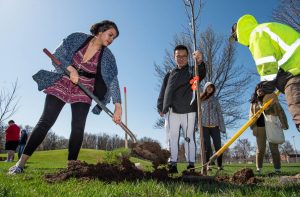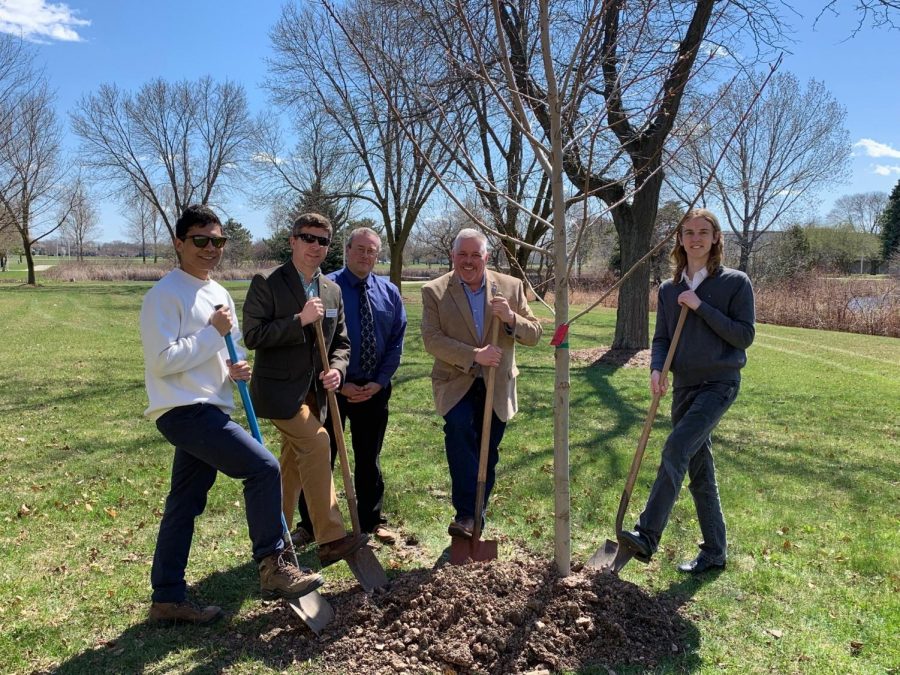UWFDL, UWFV make tree-mendous progress
Pictured (left to right): Gilberto Castaneda, UWFDL student; Brian Kolstad, president, FDL City Council; Martin Rudd, vice chancellor, UWFDL and UWFV; Brendan Stormo, past-president, FDL Morning Rotary; and Erik Janssen, UWFDL student plant trees.
May 9, 2019
UW-Fox Valley was named a tree campus by the Arbor Day Foundation for the seventh year in a row for its efforts in forestry and sustainability.
Tree Campus USA has five standards that colleges and universities have to comply with in order to be dubbed a tree campus, according to its website.
The website said tree campuses are required to have a Campus Tree Advisory Committee, a campus tree care plan, a campus tree program with dedicated annual expenditures, Arbor Day observance and a service learning project.
Assistant Chancellor for Access Campuses Martin Rudd said UWFV is one of several hundred tree campuses in the U.S. Rudd said UWFV has an expansive tree care plan.
“That’s a plan for all of the trees on the campus that can include things like pruning diseased trees, correct techniques at mulching, watering new trees,” Rudd said.
Rudd said UWFV has an oversight committee that includes community members, students and faculty members.
“In the case of UWFV, it’s the city of Menasha arborist who sits on our committee providing oversight of the management of the trees,” Rudd said.
UWFV also directs financial resources towards tree management as required by tree campus USA, Rudd said.
“We can put that in terms of labor, or materials, new tree costs and tree care that we would do on campus,” he said.
Rudd said most importantly, tree campuses are required to get students involved with a service learning project.
“We took a class of students from Jason Mills’ biology class to help plant trees around Clovis Grove park,” Rudd said. “Together with some third graders, we planted more than 20 trees.”
Rudd said while Fox Valley is a tree campus, UW-Fond du Lac is not, but administrators are working to change that.
“We had an Arbor Day celebration [at UWFDL] so we could begin that process of getting recognized as a tree campus,” Rudd said.

UWFDL students help plant trees.
Director of Communications for the Access Campuses Laurie Krasin said UWFDL students, faculty and staff celebrated Arbor Day on April 26 by planting a tree near the University Center.
“The Fond du Lac Morning Rotary also supported the planting of 30 trees along University Drive recently to further enhance the campus grounds,” Krasin said.
Rudd said the access campuses’ sustainability efforts go beyond tree management, such as the green roof on top of the communication arts center at the UWFV campus.
“There are plants on the roof that don’t require maintenance,” Rudd said. “They absorb water in the form of snow or rain and help mitigate the runoff from large structures.”
Rudd said UWFV also has solar panels on the roof of the engineering building.
“We just received some information on how much electricity was given back to the grid as a result of that solar array,” Rudd said. “We received a grant for that from both UW-Platteville and WPPI Energy to build that solar array on the roof.”
Biology professor Teresa Weglarz said she’s involved in composting at UWFV.
“We have six green bins around campus that are labeled compost,” Weglarz said. “The finished compost is used in the campus hoophouse. Students are currently growing lettuce, beans, tomatoes and other veggies in the hoophouse.”
She said UWFV also partners with St. Joe’s Food Pantry in Menasha in its composting efforts.
“St. Joe’s will drop off food waste and we use it in our composting vessel,” Weglarz said. “We close the loop by producing food, which can be donated to St. Joe’s.”
Weglarz said institutions of higher learning embracing sustainability can highlight different approaches that don’t have to be expensive.
“These approaches also provide an important learning opportunity for students since students get to see the benefits and drawbacks of different approaches,” Weglarz said.














